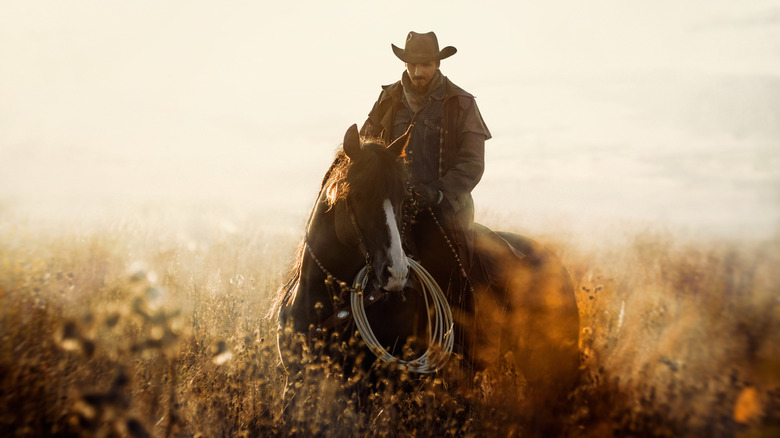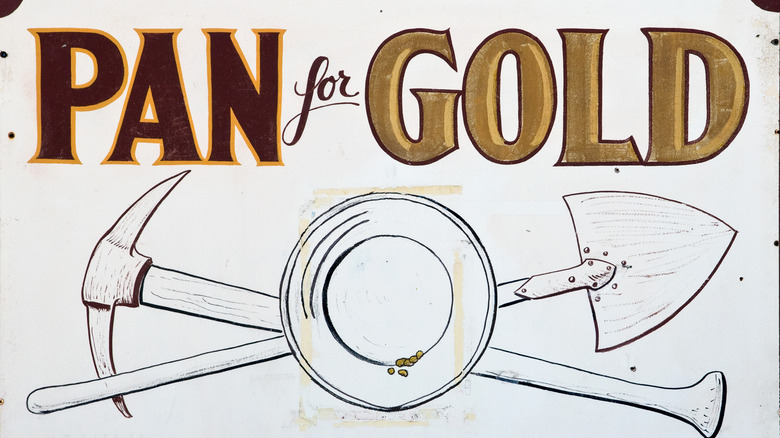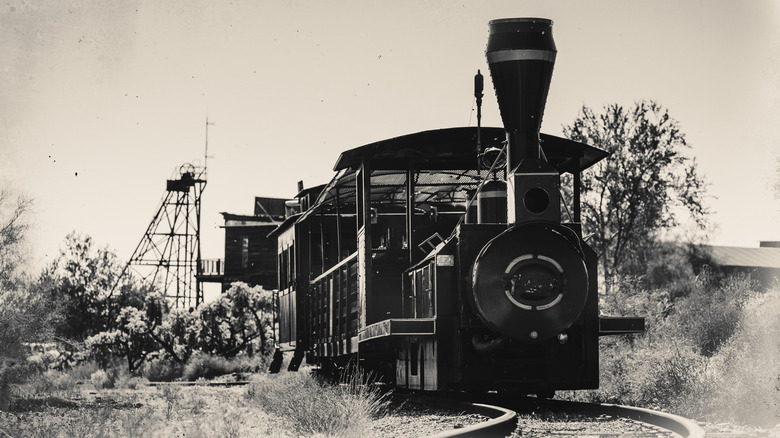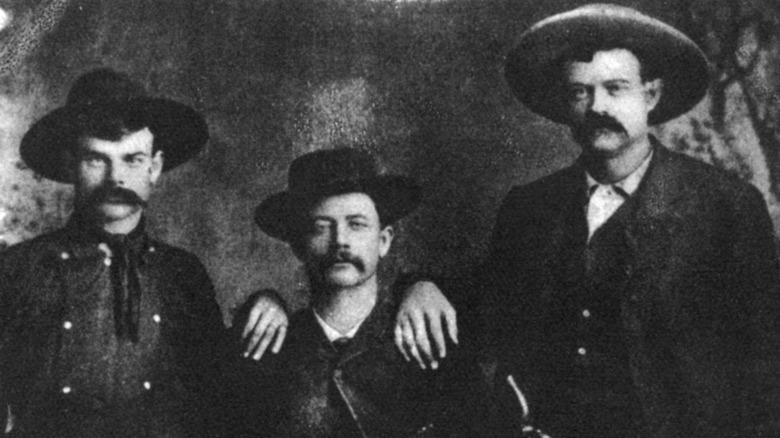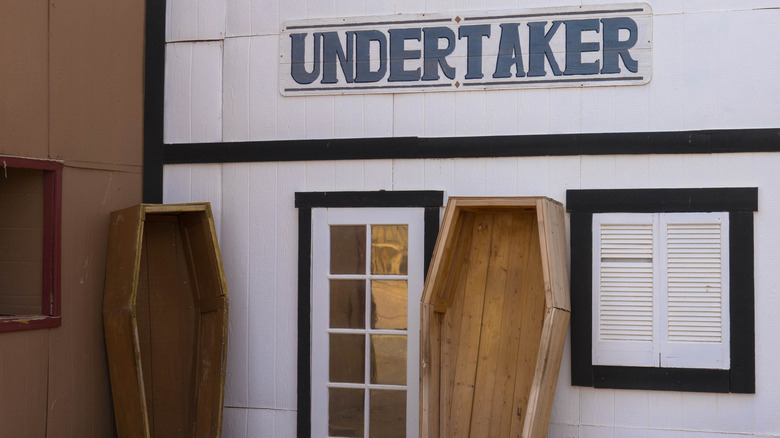The Untold Truth Of Outlaw Sam Bass
The late 19th century saw the rise of western expansion and a new American frontier fraught with danger and lawlessness, as the pursuit of fortune out West grew faster than the steady rise of order and authority. The Wild West was scourged with outlaws and criminals that dominated headlines and captured the imagination of American citizens, many of whom continue to be fictionalized over a century after their crimes and misdeeds.
One such outlaw is Sam Bass. Bass was born on a farm in Indiana in 1851 and was already orphaned by the time he was 13 (via Frontier Times). After spending five years with an uncle, Bass ran away, originally to Mississippi to work on a sawmill and later to Texas to live the cowboy life. Bass would take on many more odd jobs throughout the honest period of his life, including a soon-to-be ironic stint as an assistant to the town sheriff, who had seen little to indicate this boy would go on to become one of the most famous outlaws of the Wild West.
Horse racing would turn him criminal
So what turned the young drifter from an honest boy looking for work into an infamous outlaw that lives on in the history books? The first step down the criminal path for Sam Bass came in the form of the most dastardly of animals: the pony. According to Legends of America, Bass, who had a reputation for being an exemplary young man, bought himself a young mare, which he raced on Saturdays with much success. The sheriff he worked for noticed the horse racing became more important to Bass than his everyday work and advised the young drifter to sell his pony.
Bass loved his mare, which also earned him a significant amount of money compared to the hard work and measly pay of his last few jobs. The sheriff gave Bass an ultimatum: either lose the pony or lose the job. Bass didn't hesitate, and quit his job. Bass traveled to San Antonio and signed up as a cowboy for a cattle drive up north, organized by a man named Joel Collins. The two would soon terrorize the American Frontier together.
The Gold Rush left them broke
Sam Bass' time as a horse racer made him a gambling man, a vice that would swiftly put him on the path of crime (via Round Rock Texas). After selling their cattle in Nebraska, Bass and Collins decided to use their profits on the biggest gamble of all: the Gold Rush. They traveled to Deadwood, South Dakota, in hopes of getting in on the gold found nearby in the Black Hills. Like many who bet it all on gold, the pair were left broke. It was time to turn to a new venture to earn some coin: robbing stage coaches.
Along with two other associates, Jack Davis and Nixon, the quartet held up seven stages over two months, earning the nickname the "Black Hills Bandits" in the process. The success from the stagecoaches wasn't enough for the four criminals, and soon they turned their eyes toward the much more lucrative and dramatic world of train robberies.
Bass made it big with train heists
The Black Hills Bandits added two more to their posse, and under the leadership of Collins, rode over to Big Springs, Nebraska, in 1877 (via TSHA). In September, the outlaws held up a Union Pacific passenger train, taking $60,000 in $20 gold pieces, along with $1,300 and four gold watches from the passengers. The bandits divided their fortune and went their separate ways. Half of the train robbers would be dead within weeks, including Collins. Bass, however, disguised himself as a farmer and slipped back to Texas, where he started his own gang.
Bass and his bandits continued to rob stagecoaches and trains in the area around Dallas, and though he never quite matched the Big Springs haul, all of North Texas was on the lookout for the outlaws. Many historians have wondered why Bass had returned to thieving so quickly after his sizable loot from the train robbery; there simply wasn't enough time for Bass to blow all his winnings, meaning the outlaw was in it for the love of the game more than anything.
Bass was known as a Robin Hood type
The idea that Sam Bass wasn't actually too bothered about money is backed up by the many tales of his benevolence and generosity toward civilians. According to the Brownwood Bulletin, Bass was more than happy to hand out $20 gold coins like pennies to anyone who showed him kindness. He offered tips to the workers on trains that he robbed and returned to a farm to pay for a bag of grain he stole for his horse, offering a gold coin worth significantly more than the stolen goods. Paying more than an item's value was something of a trademark for Bass, who tipped handsomely for anything ranging from new saddles to drinks from a bucket of water.
As the bounty on Bass' head grew, so did the mob of Texans after the outlaw, desperate for the financial windfall during the financially unpredictable climate of the Wild West. One bounty hunter claimed that he came across Bass, armed, near a general store. Bass, who quickly susses out that the man was after his life, asked the bounty hunter if he had any family. When the man told of his many hungry kids, Bass went into the general store and returned with apples and candy in exchange for complete forgetfulness of the entire encounter.
An undercover cop led to his death
According to the Texas State Library, Bass and three of his gang members went to Round Rock, Texas, on July 19, 1878, in order to rob the bank. It was a typical heist for the Sam Bass gang, but this time there was one fatal twist: one of Bass' gangsters was actually an inside man from the law. When the outlaws rode in, three Texas Rangers were waiting for them, along with local law enforcement.
A gunfight broke out in a convenience store that saw the deputy sheriff killed and Bass lose fingers from his right hand. As the gangsters fled, the Texas Rangers arrived and shot Bass in the spine. His men rode out of town with the dying gang leader and were forced to leave him behind when it was clear his wounds were fatal. Bass was later recovered and brought back to Round Rock, where he died three days later on his 27th birthday. Though he was eventually caught and killed for his crimes, his daring escapades and image as a Wild West Robin Hood mean his legacy still lives on to this day.

